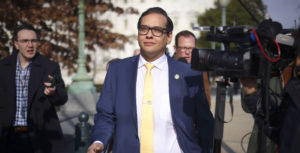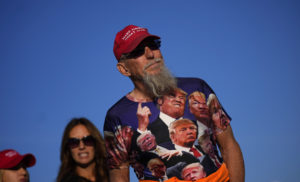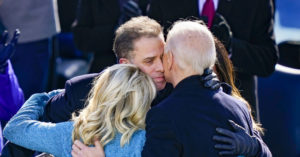In the run-up to the contest for a major party’s presidential nomination, a challenger emerges to run against the man widely acknowledged as that party’s standard bearer. The challenger declares that the party must be prevented from drifting too far into ideological extremes, and that only a restoration of old values can save the party from perdition. This is a description not so much of Nikki Haley but of one Henry Skillman Breckinridge, who challenged Franklin Roosevelt for the Democratic presidential nomination in 1936. Breckinridge ran on a repudiation of the New Deal and the promise of a return to the age of Grover Cleveland. He won 2.6% of the vote. In the history of that era, he is a footnote to a footnote.
This week, Nikki Haley launched her own bid for historical sub-footnote status (she is polling around 3%) when she declared her intention to seek the Republican presidential nomination in 2024. The former South Carolina governor and ambassador to the United Nations is the first official challenger to her former boss Donald Trump. Commentators and bookmakers are largely agreed on her campaign’s (wholly non-existent) chances. The real challenge to the former president’s hold on the GOP will most likely come from Florida governor Ron DeSantis. But his appeal to the base is that he is a younger and more disciplined version of Trump, who can essentially continue what Trump started in 2016. With her appeals to the conservatism of the George W. Bush era, Haley can be expected to play the same role as Breckinridge: the swansong of a dying breed and the harbinger of her party’s irrevocable transformation. But even so, for the future of Republican politics and strategy, there is more to Haley’s bid than the sense of inevitable defeat that infuses it.
Clues about the true significance of the Haley campaign may first be found in retracing the relationship between the 45th president and his one-time ambassador. Nimrata Nikki Randhawa was born and grew up in Bamberg, South Carolina, the daughter of Sikh immigrants who came to the US by way of Canada from India. After graduating from Clemson University, she rose through the ranks in local politics and married national guardsman Michael Haley, converting to Christianity and later getting elected as a Republican to the state legislature in 2004. Haley became a national figure upon winning the governorship of South Carolina in 2010 as part of a Tea Party wave. Combining traditional conservative positions on taxes and social issues with an energetic populist style, Haley and the Tea Party represented a revival of GOP fortunes in the Obama years. She is also remembered for her call to take down the Confederate flag in 2015 after the Charleston massacre, and was touted as a serious presidential contender in 2016 though she opted to stay out of a crowded field.
Of course, that was the year both mainstream conservatism and liberalism were shattered by the insurgent force of Trumpian populism. Going well beyond the Tea Party, the real-estate mogul openly repudiated Bush-era conservative shibboleths, such as the Iraq War and free trade, while vociferously rejecting the establishment’s relatively moderate stances on immigration. As one of the party’s leading figures, Haley faced a choice between calling out Trump on principle or falling in line. Like many establishment conservatives at that juncture, she chose wisely: she did both.
At times, Haley appeared to criticise Trump, such as during her 2016 state of the union response when, in a veiled reference to her party’s frontrunner, she warned against the temptation “to follow the siren call of the angriest voices”. When her preferred candidate, Marco Rubio, was eliminated, she indicated she would vote for Trump but made clear that she was “not a fan”. In the end, Haley managed to say just enough to maintain her image as one of the respectable Republicans, but not nearly enough to anger or alienate the nominee. After Trump’s victory, Haley accepted the offer to serve as America’s envoy to the UN: it was an appointment that seemed to confirm the newfound unity between the president and the party establishment.
At the United Nations, Ambassador Haley brought this political balancing act onto the international stage, gaining a reputation as the “good cop” of the Trump administration. This often meant adopting a of tone of rhetorical moderation to counteract Trump’s less statesmanlike instincts, while still pledging fidelity to the president. Nonetheless, Haley’s positions seemed to illustrate the distance between Trump and Bush-era foreign policy. For instance, while Trump was in favour of forging closer ties to Putin’s Russia and, at least initially, questioned the viability of Nato, Haley made a point of reaffirming the Atlantic alliance throughout her ambassadorship and took stands against Moscow and other authoritarian regimes.
When Haley stepped down in 2018, Trump praised her and she returned the favour in her memoir, in which she lauded her former boss as a strong president who was “great to work with”. A breach in relations due to January 6, after which Haley denounced Trump, was soon repaired when Haley later went back to supporting him. In 2021, she made clear she would duly make way for the former president if he opted for another run . “I would not run if President Trump ran, and I would talk to him about it… That’s something that we’ll have a conversation about.”
Even now, however, with Haley reneging on her pledge, Trump doesn’t seem all that bothered, writing on Truth Social, “Nikki has to follow her heart, not her honor. She should definitely run!” Unlike with DeSantis, Trump appears to be content with going soft on Haley, despite many lines of attack being open to the former president, such as tarring her as a disloyal “Republican In Name Only”, which can be enough to excommunicate someone from the party. Instead, the task of attacking her has fallen to Tucker Carlson and Trump’s other backers, who have referred to her as the “Carly Fiorina of 2024”, his one female rival from 2016.
The lack of any real antagonism between Haley and Trump has led some to suggest that the former’s campaign is just a prelude to a possible vice-presidential selection (though he would likely be better off picking someone ideologically closer to him to avoid a repeat of the awkward relationship with Mike Pence), or part of some divide-and-conquer strategy to diffuse opposition to Trump and weaken the chances of Ron DeSantis. In this case, Nikki Haley’s run is not as pointless as it seems. Whether she is fully conscious of it or not, her campaign could very well be a welcome exercise in “regulated opposition” within the Republican Party.
That still begs the question: why is there so little tension between the two divergent wings of the party represented by Trump and Haley? After all, to hear Haley speak is to be transported to the halcyon days of post-Cold War Republican orthodoxy, when global market capitalism (neoliberalism) and military interventionism (neoconservatism) were unquestionable. This is a world away from the “America First” nationalism of Trump and the newer crop of populists, with its echoes of prewar isolationism and protectionism. Yet the Republican Party seems to have room enough for both of these tendencies without any big protracted battles over policy.
And while there now appears to be a brewing war of words between Trump and the Right’s traditional powerbrokers (like the pro-business Club for Growth and Americans for Prosperity, who are threatening to withhold their support in favour of more orthodox candidates such as Haley), the understanding seems to be that this is a mere pantomime act. The parties will go through the motions of dissent and protest before inevitably rallying to Trump (as they had done after 2016). Indeed, the Club for Growth has already made it clear that they would support Trump in the general election if he became the nominee.
The explanation for the lack of genuine ideological conflict is simple: surface-level squabbles belie a practical convergence on policy. As president, with the partial exception of tariffs, Trump readily outsourced his agenda to Washington insiders with either neoliberal or neoconservative inclinations like John Bolton, producing a record that is in many ways a continuation of the old regime, on everything from tax cuts to immigration to foreign entanglements. In return for acquiescence to party regulars on policy, Trump was given free rein to ratchet up the culture war and to rebrand the GOP into the MAGA party, while effectively retaining much of the four-decades-old conservative programme.
Unlike Henry Breckinridge, who really did disagree with FDR (and who bolted from the party), the contrast between the likes of Nikki Haley and Donald Trump is mostly one of posture and aesthetics. In distancing herself from the former president rhetorically while nonetheless working to ensure that national policy follows party orthodoxy, Haley embodies the non-dilemma of the Republican establishment. Their struggle is not in deciding between principle and power, but in preserving the appearance of principle while reaping the spoils of power.
Disclaimer
Some of the posts we share are controversial and we do not necessarily agree with them in the whole extend. Sometimes we agree with the content or part of it but we do not agree with the narration or language. Nevertheless we find them somehow interesting, valuable and/or informative or we share them, because we strongly believe in freedom of speech, free press and journalism. We strongly encourage you to have a critical approach to all the content, do your own research and analysis to build your own opinion.
We would be glad to have your feedback.
Source: UnHerd Read the original article here: https://unherd.com/




